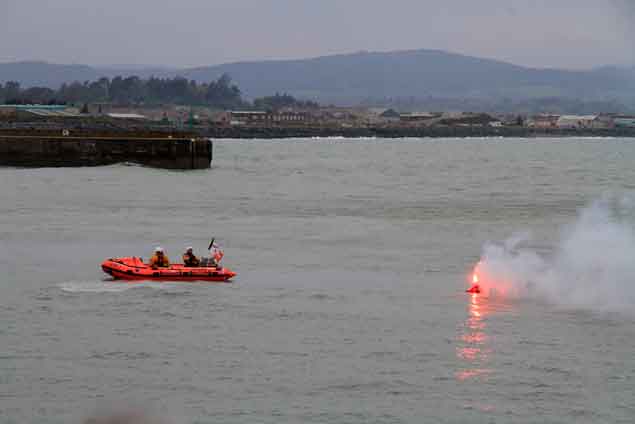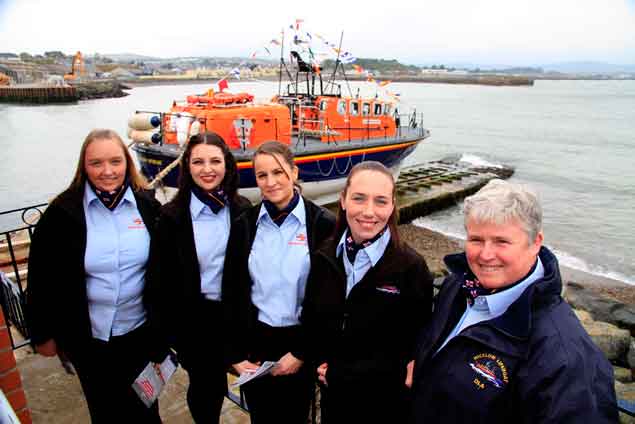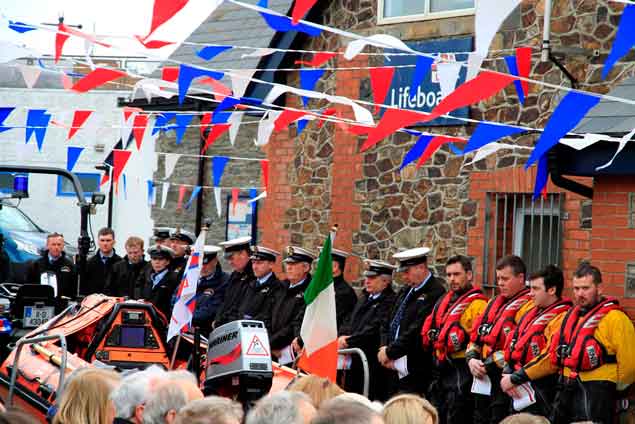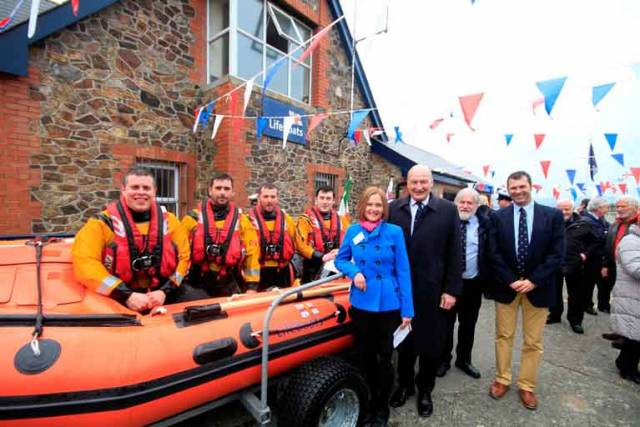At a special ceremony held yesterday (Saturday 6 May), Wicklow RNLI officially named its new D class lifeboat, Dennis-Audrey.
David Delamer, chair of the RNLI Council in Ireland, accepted the lifeboat on behalf of the RNLI before handing her over into the care of Wicklow Lifeboat Station.
The funding for the new lifeboat came from Gladys Audrey Deakin, known as Audrey, who lived in Coventry, and left her residuary estate to the RNLI.
Audrey and her late husband Dennis loved holidays by the sea and were impressed by the work of the charity’s volunteers. It was their dream that their bequest be used to fund a lifeboat and that it would be named after them.
 Wicklow RNLI performs a simulated exercise on the new lifeboat for well-wishers at the end of the naming ceremony and service of dedication for the D class Dennis-Audrey.
Wicklow RNLI performs a simulated exercise on the new lifeboat for well-wishers at the end of the naming ceremony and service of dedication for the D class Dennis-Audrey.
The couple were represented at the ceremony by Audrey’s solicitor Michelle Gavin who handed the lifeboat to the RNLI.
In his address, Mr Delamer said that one may be forgiven for thinking that we knew little about Audrey as Michelle’s relationship with her began posthumously as executor of her will.
‘But,’ he continued, ‘we know a great deal about her through one simple action; she has provided us with this life-saving vessel. That vessel has found a home here in Wicklow and will go on to save many lives and bring countless loved ones home. That one fact says a great deal indeed about Audrey and we will remember her for her generosity and her humanitarianism for many years to come.’
Phylis Whyte, former chair of the Wicklow RNLI fundraising branch had the honour of officially naming the lifeboat during the ceremony.
Des Davitt, Wicklow RNLI Lifeboat Operations Manager said the naming ceremony and service of dedication was a wonderful occasion in the history of the lifeboat station, and paid tribute to the generosity of Dennis and Audrey Deakin.
Speaking following the ceremony he said: ‘This new craft which will be housed and work alongside our all-weather lifeboat, gives our volunteer crew the power, equipment and rescue platform they need to keep those who use the sea safe.
 Wicklow RNLI female crew members Carol Flahive, Amy O’Neill, Brid Seoighe, Lisa O’Leary and Deputy Launching Authority Mary Aldridge.
Wicklow RNLI female crew members Carol Flahive, Amy O’Neill, Brid Seoighe, Lisa O’Leary and Deputy Launching Authority Mary Aldridge.
‘Every rescue is powered by our generous supporters, people like Dennis and Audrey. Their kind and selfless gift will help ensure we in Wicklow are ready for the next call, wherever and whenever it comes. For that, the RNLI and everyone at Wicklow lifeboat station will be forever grateful to them.
Mr Davitt paid tribute to the volunteers at Wicklow RNLI saying it was they who would give the new boat life: ‘Their commitment and ongoing attendance for training means that they are highly proficient in the operation of both our lifeboats. Further testament of the dedication of the crew is their knowledge that they may risk their own lives in the service of others. There is nothing greater that a person could offer and they deserve nothing less than the best lifeboat, equipment and training that money can buy.’
He thanked the local fundraising branch too, for their untiring work and praised the generosity of the people of Wicklow and further afield for helping to raise funds to enable the station to continue to save lives at sea.
 Wicklow RNLI lifeboat crew pictured alongside their new D class lifeboat Dennis-Audrey during the naming ceremony and service of dedication at Wicklow lifeboat station.
Wicklow RNLI lifeboat crew pictured alongside their new D class lifeboat Dennis-Audrey during the naming ceremony and service of dedication at Wicklow lifeboat station.
He added that while this was a time for celebration it was also a time to acknowledge the risks taken by all emergency service personnel in the service of others. A minutes silence was observed at the start of the ceremony in remembrance of five brave members of the Irish Coast Guard who lost their lives in the past year, Catriona Lucas, Dara Fitzpatrick, Mark Duffy, Ciaran Smith and Paul Ormsby.
Last year, Wicklow RNLI which also has an all-weather lifeboat launched 37 times and rescued 38 people. The all-weather Tyne class lifeboat Annie Blaker launched 21 times bringing 28 people to safety while the inshore lifeboat launched 16 times bringing 10 people to safety.
The new inshore lifeboat is replacing the Sheringham Shantymen, which was on service for 10 years at Wicklow RNLI. The lifeboat which was named after the Sheringham Shantymen was funded by money raised at their concerts. During its time in Wicklow, the lifeboat rescued 96 people, seven dogs and a farmer’s sheep.
First introduced into the RNLI fleet in 1963, the design of the inflatable D class lifeboat continues to evolve to meet changes in demand and technology.
It is the workhorse of the RNLI’s fleet and is ideal for working close inshore, near rocks or in shallow water in moderate conditions. It can be righted by the crew if it capsizes and is also part of the RNLI Flood Rescue Teams fleet of boats.
A highly manoeuvrable lifeboat, the D class can operate closer to shore than Wicklow’s all-weather lifeboat and comes into her own for searches and rescues in the surf, shallow water and confined locations - often close to cliffs, among rocks and even inside caves.
A lifeboat station was established in Wicklow in 1857. The first lifeboat was a 30ft rowing boat.
In 1911 the boathouse was adapted and the station’s first motor lifeboat, the first for Ireland, arrived.
In 1989, the boathouse was adapted once again and the slipway extended for the station's new Tyne class lifeboat. The adaptation to the boathouse included improved crew facilities and additional extensions for the refurbished winch and a souvenir sales outlet. The slipway was extended by 24 metres.
A D class lifeboat first went on service in Wicklow in 1995 with a new boathouse extension for housing the lifeboat completed in 1997.
A crowd of well-wishers turned up to see the lifeboat officially named with a bottle of champagne poured over the side of the boat by Phylis Whyte. Following the ceremony the crowd gathered around the harbour wall to see the lifeboat launch and watch as helm Alan Goucher, Connie O’Gara, Dean Mulvihill and Paul Sillery performed a simulated exercise.
Among the guests officiating at the ceremony were Judge Gerard Haughton, chair of the Lifeboat Management Group who welcomed guests and opened proceedings; Michelle Gavin, representative of the donor, who handed the lifeboat over to the RNLI, David Delamer, chair of the RNLI Council for Ireland, who accepted the lifeboat on behalf of the RNLI and handed her into the care of the lifeboat station and Des Davitt, Wicklow RNLI Lifeboat Operations Manager, who accepted the lifeboat on behalf of the station. A vote of thanks at the end was read out by Jill Clancy-Harold, Wicklow RNLI fundraising chair.
Father Donal Roche, parish priest, and Reverends Ken Ru and Jack Kinkead, led the Service of Dedication.
Sean Olohan and the Wicklow Swim for Life choir led the congregation in song































































